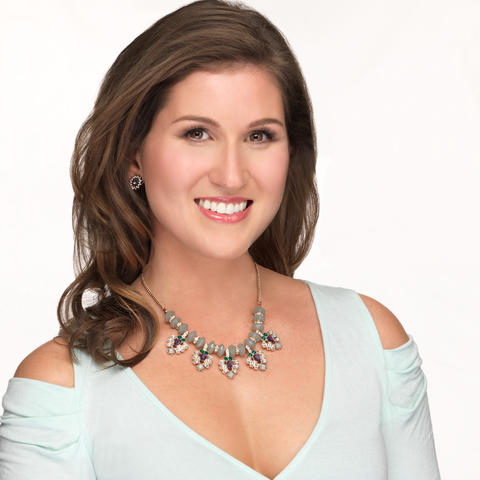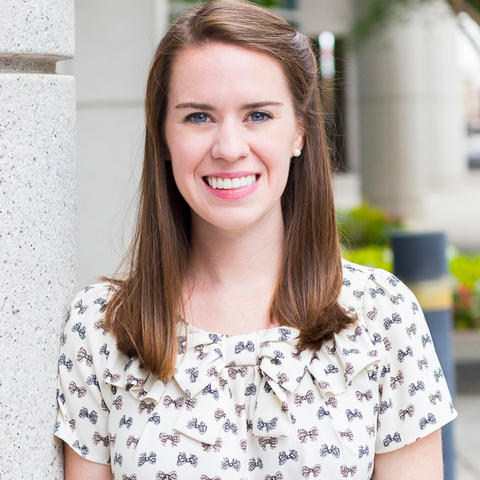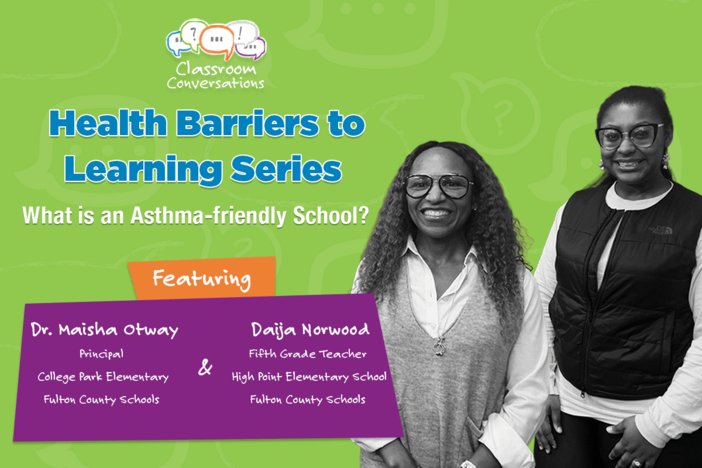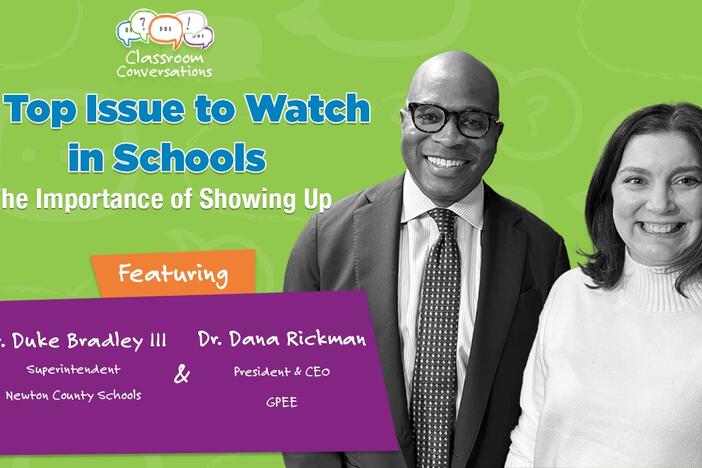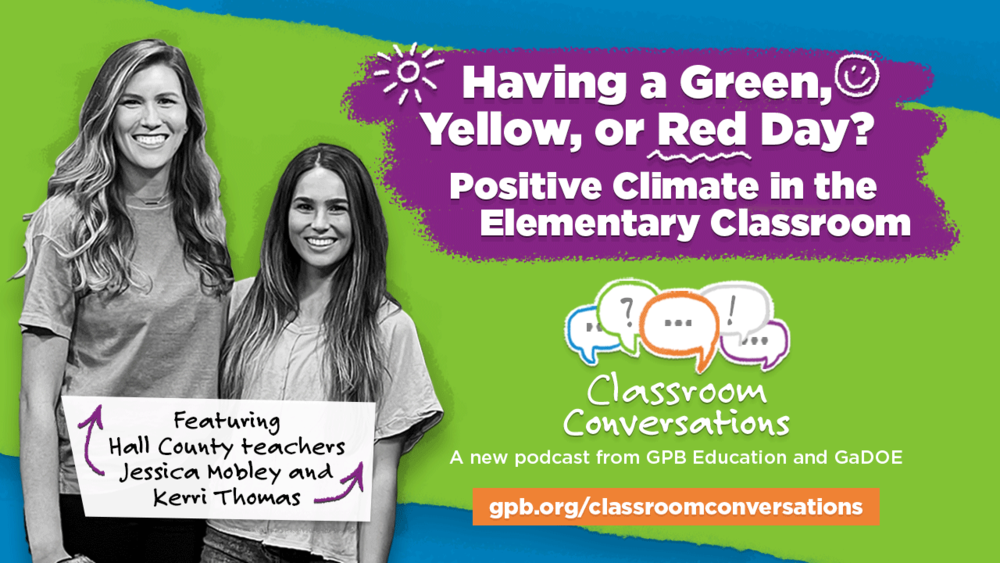
Section Branding
Header Content
Episode 101: Having A Green, Yellow, Or Red Day? Positive Climate In The Elementary Classroom
Primary Content
Hall County teachers Jessica Mobley and Kerri Thomas join the podcast to talk about how they create a positive climate in their elementary classroom.

It's here! It's finally here! In episode 101 of Classroom Conversations, Hall County teachers Jessica Mobley and Kerri Thomas join the podcast to talk about how they create a positive climate in their elementary classroom. Their discussion with host Ashley Mengwasser includes real stories from their classroom and effective strategies they use to create that positive environment.
Click here for discussion guide!
TRANSCRIPT
ASHLEY MENGWASSER: Imagine a platform for educators, a place where Georgia's K-12 teachers can share proven, substantiated curriculum and instruction techniques. A place where you can discover helpful ways to cultivate a positive classroom, the kind of classroom that shapes students for a lifetime. A place where ... All right, all right, stop the track. I'll just say it. I'll just say it. This is going to be that place. Okay. Wow. Welcome to Classroom Conversations, a new podcast series for Georgia teachers brought to you by the Georgia Department of Education in partnership with Georgia Public Broadcasting. This is the platform for Georgia's K-12 teachers. I'm your host, Ashley Mengwasser. Our first few episodes will be positive classroom conversations with teachers. We are about to have some fun, have the best variety. Today's conversation will be smart, honest, and teachers, you will love this part, what we discuss will be immediately transferable to your classroom.
Yeah, I told you it'd be great. Oh. Here at GPB Studios I've got a couple of Patriots with me. That's their school mascot, anyway, at Lyman Hall Elementary. Today's teacher feature is a dynamic co-teaching duo. Here to discuss their positive classroom are Jessica Mobley and Kerri Thomas. Welcome, teachers.
JESSICA MOBLEY: Hi.
ASHLEY MENGWASSER: Are you excited to be here?
JESSICA MOBLEY: So excited.
ASHLEY MENGWASSER: You're beaming from ear to ear. I take that as a positive sign. You've definitely got positive classrooms. Well, first things first, I was struck by the fact that your school email signatures feature your personal bitmojis.
JESSICA MOBLEY: Have to have the bitmojis.
ASHLEY MENGWASSER: I am now intrigued. So could you please tell me what you teach and a little bit about your school's culture? We've got to know more.
JESSICA MOBLEY: Yes.
ASHLEY MENGWASSER: Jessica, go ahead.
JESSICA MOBLEY: Yeah, I am a third grade teacher at Lyman Hall Elementary. It is a school that is one of a kind. You walk into the doors and you can just feel the love and care from wall to wall. Every teacher is an advocate for our kids, and I wouldn't want to be anywhere else.
ASHLEY MENGWASSER: Kerri, you echo those thoughts?
KERRI THOMAS: Yes, definitely, for sure. So I'm the special ed teacher in her classroom, and I would just like to say Lyman Hall Elementary is the most caring place on earth. And I really do mean that. Like she said, you walk in and it just beams love. And it it's amazing. Because relationships with our students, that's our top priority, and that's across the school and across the district as well. So we teach an inclusion classroom, and if you don't know what that means, that's just where all students with and without special education services, they are fully involved, they are fully included, and they're all very valuable to our classroom.
ASHLEY MENGWASSER: Well, this isn't a travel show, but now we all need to go there. So thank you for that pitch. All right, moving into our discussion, I want to talk about the year 2020. We all remember it pretty unfondly, much like me attempting a back bend over the age of 30. I know that for you teachers teaching during the pandemic was a true challenge. So can you share some of the difficulties you faced?
JESSICA MOBLEY: Yes, of course. So when the pandemic hit, we were in a frenzy, we did not know what to do. And we were all learning, building each day as educators, and we had to come together to figure out the best solution for our students. And I'm sure through every school each solution looked different based on the kids and the kids' needs, but for our school and my experience, it was looking at each child and thinking about what each individual family is going through through this crisis. And every time we had the chance to talk to them on Zoom, or whether they're at home or at the babysitter's or in a car, it was building those emotions and supporting them through what they were going through, was the most important thing.
And giving them a sense of normalcy when things are not normal. So playing a game, keeping things lighthearted, and just letting them know that we love them and we are there for them with whatever they need. I think that was the biggest thing through all of this, is to let our kids know that we care about their wellbeing as well as school.
ASHLEY MENGWASSER: Yeah. What hurdles did you have to get over, Kerri, with special education?
KERRI THOMAS: Yeah, so we were definitely making up for the loss of academic time and for that social growth over the past two years of this. Things like reading together weren't happening, and sharing and developing empathy and interacting with others. And making friends, problem solving, regulating emotions, those things that happen in the classroom, we weren't able to do that. So like Jess said, we were just trying to provide those opportunities where they did get to do those normal things in the classroom. And so we just realized how important it was to look at the whole child.
JESSICA MOBLEY: The whole child.
KERRI THOMAS: Everything that they're going through.
ASHLEY MENGWASSER: Yeah. I mean, we're adults. I don't know about you guys, but some of my skills were compromised during the pandemic too.
JESSICA MOBLEY: Yes.
ASHLEY MENGWASSER: Got to start with a stronger baseline. Well, you teachers did what you do best. You got them over it. You adapted to make the learning happen for your students because that's what teachers do. So tell me some of the solutions that worked for virtual learning. You want to go first, Kerri?
KERRI THOMAS: Yeah. So like I said, we started really looking at the whole child, not just grade level expectations, but also all aspects of students and teachers, our life, because it had changed. So just as always, academics matter, but we just made sure that our students' wellbeing, it came first. And so we taught a lot about feelings and about emotions and what to do with them with this big change that happened in all of our lives.
JESSICA MOBLEY: Yeah, and this has taught us that kids, even before the pandemic making relationships and building your classroom environment is huge. Before you can have a kid trust and learn from you, you need to have a relationship with them. But after this, students' emotional needs, they're all coming from different places through this crisis and this pandemic. Different things happened, and their emotional levels are all fluctuated. And so when they enter the classroom, it is so important for us as educators to meet them where they are and to meet their needs and to guide them through every second of the day. Modeling, having conversations with each other and role playing and guiding emotions and teaching them how their feelings are okay and their feelings are valid. And that I think is so important after this pandemic. It has taught us that kids' emotions are important and they are valued. And we need to make sure that they are aware of that before academics can be taught.
ASHLEY MENGWASSER: You affirmed that for them.
JESSICA MOBLEY: Yes.
ASHLEY MENGWASSER: Feelings matter.
JESSICA MOBLEY: Yes.
ASHLEY MENGWASSER: Feelings matter. Okay. Well, today we're talking about your positive classroom. I can already tell it's really positive based on knowing you two. So we're curious to hear how you've shifted back to in-person learning. So tell me how you've established a positive classroom climate. Kerri?
KERRI THOMAS: So we really built on relationships, like we said, with each individual student. So yes, we built a classroom that felt like family, but we also got to know each student's story. Because we knew that they had experienced something hard, and they each come into our classroom with different backgrounds, different experiences. And so we really built on those experiences, those strengths. And what we really aim to do every single day is to make sure that our kids leave our classroom knowing that they matter, that they're important, they're loved, and that they bring things to our classroom and our world that no one else can. And so we try to do that every single day.
ASHLEY MENGWASSER: So inspiring. Jessica?
JESSICA MOBLEY: Yes, having kids walk into their classroom and feel like they are a part of the classroom is huge. Letting kids have ownership of where they are, letting them make decisions. And sometimes they don't know how to make decisions because they've never been guided to make ...
ASHLEY MENGWASSER: They've never been empowered to do it.
JESSICA MOBLEY: They've never been empowered to do it.
ASHLEY MENGWASSER: Yeah.
JESSICA MOBLEY: So teaching them that empowerment is huge, giving them opportunities to make decisions and teach them what that thinking is like. So what I'll do a lot of times in the classroom is I'll say, "Okay, let's listen to how Ms. Mobley's thinking rolls through this." And I will explain my thinking and then I will ask them, "Well, how would you think about it?" And giving kids the chance to talk and have ownership, have goals, set academic goals as well as social emotional goals, is huge. You are giving kids the skills that they need that are going to last them a lifetime. And so when they come back into the classroom from something like this, we have to just, we have to give them the opportunity to figure it out, and give them the opportunity to fail and learn how to fail and what that feels like. You know?
ASHLEY MENGWASSER: Yeah. Give me another note on that, because we talked about that before, about how important failing is.
JESSICA MOBLEY: Oh, of course.
ASHLEY MENGWASSER: Let me just get a little tidbit.
JESSICA MOBLEY: So at the beginning of the year I ask my students, I say, "What do you think I'm going to say to you when you make a mistake?" And their eyes get really big and they're like, "Oh, gosh,"
ASHLEY MENGWASSER: You made a mistake.
JESSICA MOBLEY: "I made a mistake, you're going to tell me to do better or you're going to tell me to try harder." And I say, "No, I'm going to tell you great job." And I remember one of the students in my class, Kerri was sitting there, he said, "Man, I'm going to have to get used to that." And I said, "Well, yes. And why do you think I'm going to tell you that?" And I said, "So give me a raise of hands. Is Ms. Mobley perfect?" And of course they're like, "Yes, you're perfect."
ASHLEY MENGWASSER: I love this fan club of yours.
JESSICA MOBLEY: Oh my gosh, I was like, "Yes. Okay. Well, guess what? I'm not, I make mistakes every single day. And mistakes are a good thing. And how we make it through our mistakes is how we are going to make ourselves better." And so I think Miss Thomas was in our classroom the other day and I was reading a word problem. And I always tell them, don't start working your word problem out until you've read the question fully. And I saw her over on her whiteboard and she starts working it out and she hasn't read her question fully. And I said, "Stop." I said, "Ms. Thomas, you made a mistake. And I love that you made that mistake. Let's learn from Ms. Thomas's mistake." And so giving them those real life opportunities to see that we're not perfect and our feelings are validated.
ASHLEY MENGWASSER: Is this story true, Ms. Thomas?
KERRI THOMAS: Yes, it was funny. As soon as I started doing this, my group, so I was actually on one of the teams, and they're looking at me and they're like, "No, don't do that." And it's so funny because we are, it's like a family. So whenever we are maybe not good at something or we missed a direction, we are just working as a team to figure it out. So we figured out, okay, we have to listen to the whole question and then we can start working. So it was good to show them that we also make mistakes too.
JESSICA MOBLEY: We're not perfect.
ASHLEY MENGWASSER: Right, and you made it collaborative.
JESSICA MOBLEY: Of course.
KERRI THOMAS: Yeah.
ASHLEY MENGWASSER: I'm sure they'll remember that forever.
KERRI THOMAS: Yes.
ASHLEY MENGWASSER: Let's discuss Project AWARE, the federal grant. So for our listeners, AWARE as an acronym, it stands for advancing wellness and resilience in education. Here's a little summary from the Georgia Department of Education website. The purpose of Georgia Project AWARE is to increase awareness of mental health issues among school aged youth, provide training in youth mental health first aid, and connect children, youth, and families who may have behavioral health issues with the appropriate services. So that's AWARE for you. How have you seen Project AWARE and the Project AWARE grant increase mental services at your school? Jessica, you want to take this one first?
JESSICA MOBLEY: Yes. Our county, Hall County, did a huge district wide mental and healthcare awareness training for our whole district. And it gave lots of examples of how kids may be feeling during this time and strategies that educators can use to support them during this, because that's huge. Also at our school, our whole school is involved in supporting each other because we have to work together. As educators we have to band together in order to support our children. And then giving opportunities for families to let us know what they need and how we can support them through this time.
ASHLEY MENGWASSER: Kerri?
KERRI THOMAS: So like we said, the school and district has prioritized those relationships. So even in our school we have a wellness team where we check in on each other, how we're doing, what we need. If somebody's going through even some the personal, like they lost a family member or anything like that, we're there for each other at the school. As well as just learning about those signs of trauma and those skills to tackle those issues that we're seeing at the school level. That was something I had never really experienced before in such a real way. And so those skills, we're using those every day. We didn't know when we got this training that it would be so impactful for us, but we're seeing it and using it every single day.
ASHLEY MENGWASSER: Can you give me just a couple examples? What are some of the signs of trauma they tell you about? How do you identify?
JESSICA MOBLEY: Well, I can give you an in-class example.
ASHLEY MENGWASSER: Please.
JESSICA MOBLEY: So there's a student who was upset about a problem that they got wrong. And they immediately, hood over head, face down, defeated.
ASHLEY MENGWASSER: Shut off.
JESSICA MOBLEY: Completely turned off. And so then it becomes, I need to have a conversation. How are you feeling? What made you feel that way? And how can we, what strategies can we use to help you right now? And they will, and we use, we'll talk about that in just a second, but zones of regulation. So we talk about how our feelings ... And students, because we've gone through this, they don't know how they're feeling. And feelings turn into emotions, they turn into behaviors, they turn into ...
ASHLEY MENGWASSER: Beliefs eventually.
JESSICA MOBLEY: All these things, that if we are not facilitators of emotions and helping students understand what they're feeling, then we just have to do it. We have to. So important.
ASHLEY MENGWASSER: Anything to add to that, Kerri?
KERRI THOMAS: I agree. We see it. We see it a lot, actually, even in just little ways with things that you wouldn't think would bother a student, or just triggers that are more apparent now that we've went through this. It's just so important that they understand how to express those things.
ASHLEY MENGWASSER: Dare I say, AWARE has made you aware.
KERRI THOMAS: Aware.
JESSICA MOBLEY: Oh, yeah.
ASHLEY MENGWASSER: I think that was the intention of it. Wonderful. Well, we three have something in common. I don't know if you know this. I asked you a little bit about this yesterday, but all three of us are millennials.
JESSICA MOBLEY: Yeah.
ASHLEY MENGWASSER: I promise this is relevant, please no one roll your eyes. But millennials are generally skeptical about something, anything, until we've read the rave reviews, and then we're on board. Which makes me think this really works, because you have such positive things to say. So let's share some positive classroom standout moments. How is this approach working for you? If you can each give me one story. Who would like to go first?
JESSICA MOBLEY: I'll go first.
ASHLEY MENGWASSER: Go ahead, Jessica.
JESSICA MOBLEY: Yes. So like I said, feelings and emotions can come out in each individual, and it can look different for every individual. And so I have a student in mind, that their feelings and emotions were coming out as, if you were overlooked, if you were to overlook and just see this child, it might look as a behavior concern. The student might have behavior, need to be put on a behavior plan or whatnot. But every year I emphasize on relationships. So I pulled the student aside and I said, "Tell me how you're feeling. What does it look like when you get off the bus?" I just showed that I care and I want to know more about you. And this child immediately broke into tears because he knew I was asking and was invested in him.
And when he shared his experiences and he shared what he had been through, then I can go back and reflect and say, and I can guide him in a way that's going to support him through his educational career. And I can put implementations in place for him to support him. And having him be in control of that and talk it out with me and not me just tell him what he's going to to do because of his feelings, that is powerful.
ASHLEY MENGWASSER: How did that change him in the classroom after that?
JESSICA MOBLEY: He was a different kid, completely different. This student is not, he has moved on, he's no longer in my class, and every morning I see him. Every single morning he's coming to see me.
ASHLEY MENGWASSER: Oh.
JESSICA MOBLEY: And tell me to have a great day. So those everlasting relationships, I tell my students, "I am not just your third grade teacher. I will be your teacher until you graduate school if there's anything that you need." But just them knowing that I am there to support them and validate them and hear them, that's our goal as educators.
ASHLEY MENGWASSER: Powerful. Kerri, tell me your story.
KERRI THOMAS: So I came into Lyman Hall last year, and I was a brand new teacher. And I walked into a situation where there was a student who was struggling expressing his emotions. And it brought a lot of fear to those around him because it came out maybe through anger. Even if he was feeling really sad, it would look like rage. Or if he was feeling happy he may even seem upset because he didn't quite know how to express that. So because of that, he was pulled out of his classroom a lot into a separate classroom where we could better meet his needs, because we felt like that was what was best for him at that time.
But what me and Jessica started to see is that he is a kid who is always pulled out away from his peers. He is always in trouble. He is mad at the world because of this, because that's hurtful. If that happened to any of us, that would really hurt. So he just felt so misunderstood. And so what we did is we just invested, like we said, in relationship with him. And it took time because his guard was up. This wasn't normal for him. He didn't have many friends. He didn't have a lot of relationships with teachers because it was hard to build a relationship with him.
JESSICA MOBLEY: It was him against the world.
KERRI THOMAS: Yeah. Yeah, he was just fighting really to survive at this point. And what we did is just took that time. It was weeks of just showing up for him every day. It became almost my motivation. Every morning I was like, "I've got to go see him. I can't wait." And what that did for him, though, is it gave him a chance to have a relationship. And that obviously taught him skills for communicating, for building a relationship, what that requires, coping mechanisms to better handle situations he faced. And ultimately what we did is we pushed him back into the classroom with his peers. And he was able to see that, "I'm a part of this family, this class, and these people care about me. My teachers care about me. My friends care about me."
It was really a lifelong lesson, I think for everyone in that classroom, because we got to learn that we're all different and we express things differently, but we can work together to figure things out. And he got to experience that really, I think, successfully for the first time. And it was just really beautiful to see that change in him, and really it changed us as well.
ASHLEY MENGWASSER: It changed me too. I'm only hearing about this for the first time. Well, you're teaching young learners. It's what you're called to do, it's what you go to school to do every day. But as you've told us during this episode, they're young people too, young individuals with complex backgrounds and lives. So tell us why the positive classroom climate is so important to these young people.
JESSICA MOBLEY: Well, learning cannot take place unless we have a positive classroom climate. And when you think about your day, you may have all of these things planned in math and reading and writing, and something may come up where you have to stop and have a conversation about that skill and about those emotions and building those relationships with kids. For example, in math, if we're teaching and I want kids to work in a small group, I need to model for them what that looks like, and I need to give examples that may not happen, but if they do happen, how do we handle those? How do we navigate through our feelings and our emotions? But developing a positive classroom, it gives kids an opportunity to learn and it makes them feel more comfortable and ...
ASHLEY MENGWASSER: Sets them up for success.
JESSICA MOBLEY: It sets them up for success. Thank you.
ASHLEY MENGWASSER: Kerri?
KERRI THOMAS: We've seen, especially in our classroom, just, you obviously hear as you're going through college and you're learning about how to be a teacher, you hear about how important the climate is and how it bridges that gap, and the connections you build help your students learn from you. But we have actually really seen it in real life, that when we set them up in that positive classroom environment, that the academics follow. So as their skills, their emotional, their social, those skills increase and we're looking at their wellbeing, as that all increases, we've seen that their academic skills can increase as well. So for example, if we get to a math problem and it's long division and they're in third grade, you look at that, I look at that and that's hard. That's a challenge.
ASHLEY MENGWASSER: Get an immediate headache, yes.
KERRI THOMAS: Yeah. And so once they've developed those skills to face challenges through this growth mindset and not this mindset of like, "I can't do this, this is too hard. I'm going to shut down," but, "No, I can do this. I have the skills. I can take 10 deep breaths right now and think about the last time I overcame a challenge and how it made me feel, and I can figure this out." And we work together to do that. So we see that these skills, they're just as important as those academics. They're just a lot harder to measure. Because in math, I can give you a test and figure out if you know all your math facts, or I can test your ability to read, but these are a little bit harder to assess. But they're so, so important.
ASHLEY MENGWASSER: Well, you're looking for the wellbeing of the student, and it sounds like what you're doing is working. So before we go, who doesn't love a hot tip?
JESSICA MOBLEY: Oh, yes.
ASHLEY MENGWASSER: What can teachers listening to this podcast do starting today to improve their classroom climate? Who wants to go with the first tip?
JESSICA MOBLEY: I'll go. We have, our county has made a color wheel, an emotional color wheel, and you can find several of these. But having kids come in and pin how they are feeling for that day gives me an opportunity to see what's going on and have a daily check-in. Also, having students feel like their classroom is theirs. Posting their pictures up on the wall. I love to take these little pictures at recess and then print them out and cut them out and post them all around the classroom. That lets kids feel a part of their classroom. And then also letting kids set goals. I have a huge area where it's just goal setters and it's not all about academics, and letting kids pick their own goals is huge.
ASHLEY MENGWASSER: Like a vision board for goals?
JESSICA MOBLEY: Like a vision board for goals, yes. And they see it and they're working toward it. And then we have this awesome tool called Flipgrid that allows kids to video themselves. And what kid nowadays doesn't love to video themselves?
ASHLEY MENGWASSER: Oh, yeah.
JESSICA MOBLEY: And so having them go on and say their goal and how they're going to meet that goal and reflect on that goal, and then they get to go pick a new goal once they have met it. But giving a student the power to say, "I've met that goal and here's why," that's huge.
ASHLEY MENGWASSER: Brilliant. I'm writing these down as just general life advice. Go ahead, Kerri.
KERRI THOMAS: So something that's really worked for me is teaching feelings through modeling and coaching. So we talked about this a lot, but practically what it can look like, we use a tool called zones of regulation. And it puts different feelings into concrete colored zones. So there's a green zone, and that's when you're feeling really happy, you're ready to learn. You're in a really good spot. And then there's a zone that is if you may be feeling sad or a little sleepy or things like that. And so there's four zones, and it just helps them to say how they're feeling. Like we said, they're young, so it's hard to verbalize that. But when you make these connections with these colors, and also within this zones of regulation teaching, we also give them skills.
So if I'm in the red zone, which means I may be angry or frustrated or defeated, I can do this to get out. So for example, I may walk to get some water, take a break, just take a breather. And so it teaches kids not only to identify how they're feeling, but also what can I do with how I'm feeling? Which really just changes how they operate at school and at home.
ASHLEY MENGWASSER: And in life.
KERRI THOMAS: And in life, yeah. So it's really great because it's so concrete.
ASHLEY MENGWASSER: Jessica Mobley, Kerri Thomas, teachers from Lyman Hall Elementary, thank you for sharing your triumphant stories with our audience. You guys are iconic. Please stick around for autographs.
JESSICA MOBLEY: Yes, it was a pleasure. Thank you so much.
KERRI THOMAS: Thank you.
ASHLEY MENGWASSER: Thank you for being here. I'm Ashley Mengwasser. Thanks for listening. We'll be back with more Classroom Conversations, the platform for Georgia's teachers. And in case you need this reminder today, you're a great teacher. Goodbye for now.
Hall County teachers Jessica Mobley and Kerri Thomas join the podcast to talk about how they create a positive climate in their elementary classroom.

